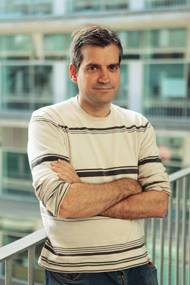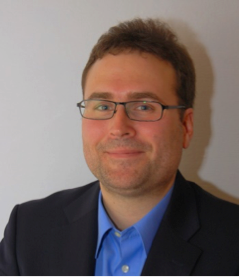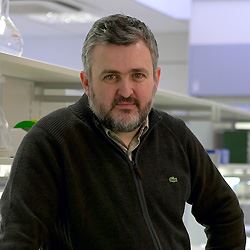Prof. Salvador Borrós i Gómez
Opublikowano: Monday February 22nd, 2016This spring representant of technological current on “Symbioza” Symposium is
Prof. Salvador Borrós i Gómez.
» show more info
Prof. Gómez is not only a leader of GEMAT group handling materials engineering in independent Químico de Sarrià (IQS) but also a Chemical Engineerind and Materials Science Department Head on Ramon Llull University in Barcelona. After graduation in chemical engineering and managment in industrial company, in 2004 he earned title of full professor in Bioengineering. Prof. Gómez is also a Founder member of the Center of Technology in Cultural Heritage Conservation. In his work he smoothly moved from strictly materials science to biological subject connected for eg. with cartilage and bone tissue cultures, polymer systems for drug doseage or bioactive surfaces enhancing cell signaling.
» hide bio
Prof. Artur Jarmołowski
Opublikowano: Sunday February 21st, 2016Our next plenary lecturer is
Prof. Artur Jarmołowski, Adam Mickiewicz University in Poznan

» show more info
Prof. Artur Jarmołowski – Deputy Director of the Institute of Molecular Biology and Biotechnology at the Faculty of Biology, Adam Mickiewicz University in Poznan, member of the executive board of the Polish Biochemical Society and the prestigious Council of the National Science Centre. The subject of his research is the structure and function of RNA, RNA metabolism, pre-mRNA splicing, as well as alternative splicing and its regulation. In 2014, he was awarded the Polish Academy of Sciences award for outstanding research describing new aspects of the microRNA biogenesis in plants. He is also the winner of the most prestigious Polish grants for experienced researchers – Mistrz (Master) (Foundation for Polish Science) and Maestro (Nacional Science Center) and is the co-founder of Poznan Consortium of RNA having the status of the National Centre for Scientific Lead (KNOW). He published in Nature and he regularly publishes in Nucleic Acids Research.
» hide bio
Prof. Stanisław Karpiński
Opublikowano: Friday February 19th, 2016The next speaker you will have possibility to listen to during V IBS ‘Symbioza’ is
Prof. Stanisław Karpiński, The Laboratory of Physiomics and Crop Design, Faculty of Horticulrute Biotechnology and Landscape Architecture, Warsaw University of Life Sciences, Poland

» show more info
Prof. Stanisław Karpiński received his PhD and DSc degrees at the Swedish University of Agricultural Sciences in Umeå, and was nominated full professor in molecular physiology of plants by Vice-Chancellor of the Stockholm University (2004). Currently, Prof. Karpiński works at the Warsaw University of Life Sciences, leading the Laboratory of Plant Physiomics and Crop Design. His team is focused on the dependence between quantum processes in photosystems I and II and redox, electrophysiologic and hormonal state of the cell as a response to biotic and abiotic stresses. As a laureate of the Welcome programme by the FOundation for Polish Science he investigates new methods of cell wall hydrolysis for biofuel production.
Selected publications:
1. Large-Scale Phenomics Identifies Primary and Fine-Tuning Roles for CRKs in Responses Related to Oxidative Stress, PLoS Genet, 2015, DOI:10.1371/journal.pgen.1005373.
2. Systemic signaling and acclimation in response to excess excitation energy in Arabidopsis, Science, 1999, 284, 654.
» hide bio
Media partners
Opublikowano: Thursday February 18th, 2016Prof. Toni Gabaldón Estevan
Opublikowano: Tuesday February 16th, 2016We are proud to present our next guest speaker
Prof. Toni Gabaldón

» show more info
Toni Gabaldón Estevan obtained his PhD at Radboud Institute for Molecular Life Sciences (Nijmegen, NL).Them he was awarded an EMBO Long Term Fellowship at Bioinformatics Department of the Investigation Centre of Prince Filip (Valencia). Since 2008 he is a Group Leader in the Bioinformatics and Genomics Programme at the Centre for Genomic Regulation in Barcelona, he is also a professor at the Universitat Pompeu Fabra (UPF), where he teaches bioinformatics and molecular evolution. In 2012 he obtained the highly competitive starting grant from the European Research Council. Prof. Gabaldón’s team is focused on using comparative genomics and phylogenetics to study the origin, evolution and function of biological systems. This includes investigations of the origin and evolution of biochemical pathways, protein complexes and cellular organelles. The group uses comparative genomics to answer important biological questions, including those related to the evolution of fungal pathogens. He has published over 60 articles in international journals including Nature, Science, and Cell.
Selected publications:
1. Late acquisition of mitochondria by a host with chimaeric prokaryotic ancestry, Nature 2016, DOI:10.1038/nature16941.
2. Synonymous mutations frequently act as driver mutations in human cancers, Cell, 2014, 156, 1324.
» hide bio
Media partners
Opublikowano: Saturday February 13th, 2016Please Welcome: Andrzej Dziembowski
Opublikowano: Friday February 12th, 2016Prof. Andrzej Dziembowski, Laboratory of Biology of RNA and Functional Genomics at the Institute of Biochemistry and Biophysics, PAS, Poland

» show more info
Andrzej Dziembowski is a head of the Laboratory of RNA Biology and Functional Genomics at the Institute of Biochemistry and Biophysics, Polish Academy of Sciences. He spent an important stage of his career in the Centre de Génétique Moléculaire CNRS in Gif-sur-Ivette, Paris, and after return to Poland he received a prestigious EMBO Installation Grant for creation of his own research group. He was awarded numerous scientific awards, such as Jakub Karol Parnas award for the best Polish experimental work in Biochemistry (2013), National Science Center award for outstanding scientific achievements (2013) or Prime Minister award for habilitation thesis (2010). Prof. Dziembowski’s research team in IBB is focused on the investigation of Eucaryotic RNA decay and processing, including analysis of macromolecular assemblies involved in RNA metabolism, and developing of cloning and protein expression tools. His dynamic research has been confirmed by numerous outstanding publications including recent (2015-2016) papers in Nature and Nature Communications.
Selected recent publications:
1. The architecture of the Schizosaccharomyces pombe CCR4-NOT complex, Nat Commun. 2016, 25, 10433.
2. Mistargeted mitochondrial proteins activate a proteostatic response in the cytosol,Nature, 2015, 524, 485.
» hide bio
Please welcome: Matthias Bochtler
Opublikowano: Wednesday February 10th, 2016The next speaker of 5th IBS Symbioza is
Prof. Matthias Bochtler, International Institute of Molecular and Cell Biology in Warsaw, Poland

» show more info
Matthias Bochtler graduated from the Universities of Munich and Cambridge, and was educated by a Nobel Prize winner, prof. Robert Huber. He moved to Poland initially as a shared position with Max Planck Institute and the International Institute of Molecular and Cell Biology in Warsaw (IIMCB). Currently, he is the head of the Structural Biology Laboratory founded In the International IIMCB in 2001. His research is focused on structural and biochemical properties of endonucleases and methyltransferases, as proteins interacting with DNA, as well as the crosslink between DNA modification and damage. He is a laureate of the Pieńkowski Award (2005), EMBO/HHMI Young Researcher Award (2004) and Crystal Award in Germany (2000, 1998). His publication record includes two Nature papers, and regular works in Nucleic Acid Research and PNAS, cited all together more than 3500 times.
Selected recent publications:
1. On the role of steric clashes in methylation control of restriction endonuclease activity, Nucleic Acids Res. 2016, 44, 485.
2. Structural basis of the methylation specificity of R.DpnI, Nucleic Acids Res. 2014, 42, 8745.
» hide bio
Please welcome: Julian Thiele
Opublikowano: Sunday February 7th, 2016We proudly present our next guest
Dr. Julian Thiele, Leibniz Institute of Polymer Research in Dresden, Germany

» show more info
Julian Thiele is a group leader at Leibniz Institute of Polymer Research Dresden (Germany). He received his BSc from Lund University and his diploma from Hamburg University, both degrees in chemistry in 2008. During his PhD, he worked with David A. Weitz at Harvard University, and graduated from Bayreuth University in 2011. Funded by the Humboldt Foundation, he worked as a postdoc with Wilhelm T. S. Huck at Radboud University Nijmegen on surfactant design for droplet microfluidics, cell differentiation in artificial 3D matrices, and copolymer vesicles from microdroplet templates.
After a short stay at Dresden University of Technology (2014-2015), he is leading one of the five young investigator groups in the newly founded Leibniz Research Cluster since October 2015 (http://www.leibniz-research-cluster.de/). As part of the strategy “Biotechnology 2020+” of the Federal Ministry of Education and Research, the LRC aims at developing novel multifunctional, cell-free platforms for biotechnological processes combining natural sciences and engineering with clear applications in drug development beyond the stage of model systems.
Beyond the activities in the LRC, Julian Thiele’s research interests include microfluidic flow cells with integrated functional components, biochemical reactions in polymer hydrogels, and metabolic engineering.
Selected publications:
1. Designer hydrogels for cell cultures: a materials selection guide, Adv. Mater. 2014, 26, 125-147.
» hide bio
Biesterfeld AG. is supporting us
Opublikowano: Saturday February 6th, 2016We would like to introduce to you one of the sponsors of V IBS:

Biesterfeld AG is one of the leading companies in the field of distribution of chemical products and plastics, located in more than 50 countries around the world. More info about the company and its products can be found on their website.

